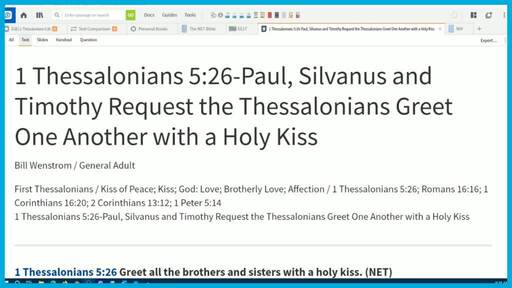Standing Firm in the True Grace of God
Sermon • Submitted • Presented
0 ratings
· 2 viewsAs Peter concludes his first letter, he leaves his readers with a few parting words that convey encouragement, partnership, love, and peace. Though these final verses may seem like a mere formality, they hold deep significance. They remind us of the power of fellowship, of standing firm in God’s grace, and of the peace that unites us as the body of Christ.
Notes
Transcript
Introduction
Introduction
As Peter concludes his first letter, he leaves his readers with a few parting words that convey encouragement, partnership, love, and peace. Though these final verses may seem like a mere formality, they hold deep significance. They remind us of the power of fellowship, of standing firm in God’s grace, and of the peace that unites us as the body of Christ.
Peter’s final greetings reveal a rich spiritual family, the steadfastness we are called to in our faith, and the grace that binds believers together even amidst suffering. Let’s explore these verses and see how Peter’s exhortations apply to us today.
12 Through Silvanus, the faithful brother (as I consider him), I have written to you briefly to encourage you and to attest that this is the true grace of God. Stand firm in it. 13 She who is in Babylon, chosen the same as you, greets you, and so does my son Mark. 14 Greet one another with a loving kiss. Peace to all of you who are in Christ.
A Faithful Brother and the True Grace of God (verse 12)
A Faithful Brother and the True Grace of God (verse 12)
Peter opens this final passage by commending Silvanus (or Silas), whom he describes as “a faithful brother.” Silvanus was a fellow worker and faithful minister alongside Peter and Paul, a respected leader in the early church. His mention here shows us that the work of the Gospel is a collective mission. Peter reminds his readers that they are not alone but supported by faithful brothers and sisters who labor together for God’s kingdom.
Peter goes on to say that through Silvanus, he has written “briefly.” Though the letter contains deep theological truths, Peter views it as a condensed message, designed to exhort and declare the reality of God’s grace. His goal is to fortify believers, reminding them that this “true grace of God” is what they must stand firm in. This grace is not a fleeting, superficial comfort; it is the divine power that strengthens them to endure suffering, resist temptation, and pursue holiness.
Application:
For us, the “true grace of God” is our anchor. In a world that often promotes self-sufficiency or despair in the face of trials, Peter calls us to stand firm in the grace that God has given us through Jesus Christ. Grace is not a one-time gift; it is the ongoing favor and strength of God. It upholds us in difficulty, empowers us in weakness, and reminds us that our salvation is secure.
Greetings from the Church in Babylon and Mark (verse 13)
Greetings from the Church in Babylon and Mark (verse 13)
Peter continues by sending greetings from “she who is at Babylon, who is likewise chosen.” Here, “Babylon” is likely a reference to Rome, the center of power and often symbolic of a world opposed to God. Just as ancient Babylon was a place of exile for the Jews, so Rome represented a kind of spiritual exile for the early Christians. This subtle reference reinforces the theme of Peter’s letter—that the believers are strangers and exiles on earth.
The mention of “she who is at Babylon” probably refers to the church in Rome, a fellowship of believers who, despite their challenging circumstances, are standing firm in the faith. This greeting emphasizes that all believers share in a common identity and destiny as God’s chosen people, regardless of where they live or what they face. Peter also mentions “Mark, my son,” indicating the close spiritual bond he shared with John Mark, the author of the Gospel of Mark. Their relationship is a testament to the mentoring and family-like bonds that develop in the body of Christ. (Acts 12:12, 25; 13:5, 13; 15:37; Col 4:10; 2 Ti 4:11; Philemon 24.
Application:
Even in the most challenging of circumstances, Christians have each other. The greetings from the church in Rome and Mark show us that we are part of a global family, united across time and place. Our brothers and sisters around the world face various struggles, yet we are united in Christ. Knowing this can inspire us to pray for and encourage one another, just as the early Christians did.
A Call to Love and Peace (verse 14)
A Call to Love and Peace (verse 14)
Peter closes with an instruction to “greet one another with the kiss of love.” In the ancient Near East, the kiss was a cultural symbol of affection, unity, and respect. For the early church, it symbolized the family-like bond between believers. Peter’s call to greet one another with love serves as a reminder that the church is not merely an institution or gathering place; it is a family knit together by Christ’s love.
Peter’s final words are, “Peace to all of you who are in Christ.” This benediction captures the heart of his letter. In Christ, we find peace—a peace that transcends circumstances and holds firm even amid persecution, suffering, and trials. Peter wants his readers to grasp that this peace is available to them no matter what comes their way.
Application:
As believers, we are called to love one another deeply and to pursue peace. Peter’s exhortation to greet one another with love challenges us to see each other not merely as members of the same faith but as family. And his prayer for peace reminds us that we, too, have access to a divine peace that the world cannot give. In a time where anxiety and division often dominate, our love and peace in Christ can stand as a witness to the world.
Conclusion
Conclusion
In these closing verses of 1 Peter, we find an encouragement to stand firm in grace, cherish the fellowship of believers, and embrace the peace that Christ gives. Peter’s final words reflect his heart for the church—a desire for unity, steadfastness, and love. However, considering what we studied and have been taught, what did Peter identify as the “true grace of God” in this letter? Let us look.
Saving Grace: It is the grace that has redeemed them, brought them into a living hope, and given them new life in Christ. (1:3; 18-19)
Sanctifying Grace: It is the grace that calls them to holiness and empowers them to live transformed lives. (1:15-16)
Sustaining Grace: It is the grace that upholds them in suffering, reminding them of God’s presence and promises. (4:12-13; 5:10)
Uniting Grace: It is the grace that binds them together as a chosen community, giving them shared purpose and strength. (1:1, 22; 2:5-9)
Persevering Grace: It is the grace that calls them to steadfastness, to stand firm in faith and to resist the pressures of the world. (5:8-9)
Therefore, let us remember that the grace of God is not just a concept but a power that sustains us. As we stand firm in this grace, we are held by a God who sees our trials, equips us for them, and has secured our eternal peace in Christ. May we live in that grace, love one another with that same grace, and stand as a community that reflects the love, peace, and hope of Jesus to the world around us. Amen.
ADVERTISEMENT
Related Media
See more





